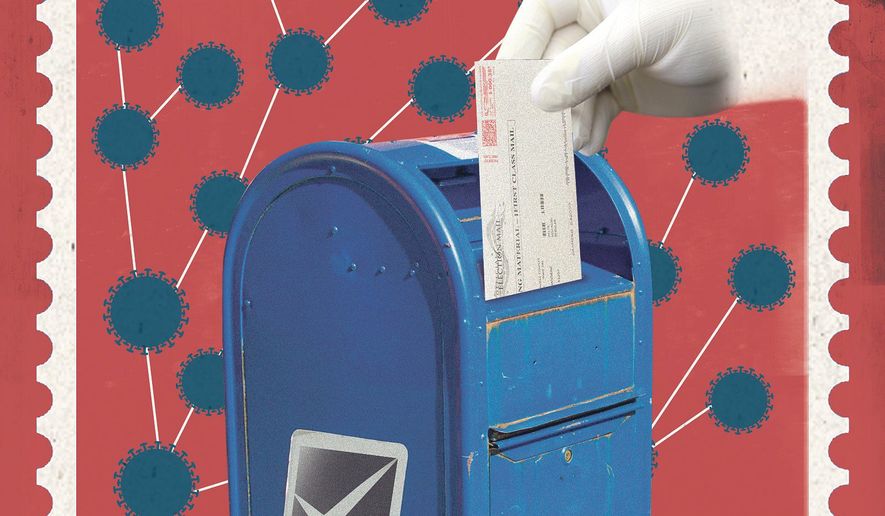OPINION:
Forced all-mail elections serve as one of the greatest risks in spreading the coronavirus once logistics are taken fully into account.
Imagine a 2020 election where the nation decides to perform an all-mail process with mandatory acceptance of ballot harvesting procedures — just like House Speaker Nancy Pelosi advanced in the early days of the pandemic.
Picture a harvester in a densely-populated city visiting dozens of houses and apartments each day — often crossing thresholds into living rooms to promote a particular candidate, cause or party. Think of the air they breathe, the touched surfaces and the collected ballot envelopes sealed with human saliva from each home. It only takes one untested, asymptomatic COVID-19 carrier’s ballot being harvested to risk exposure for the rest of the neighborhood as that political operative continues door-to-door.
Proponents have a tough sell in credibly convincing the public that all-mail ballot elections are actually safer with respect to sanitary concerns.
Let’s stick with that harvester a moment longer. At the end of her work day, she drops off the paper ballot materials handled and licked by registrants either ignorant to or in denial of their coronavirus conditions. She goes home to her romantic partner who needs immunosuppressants to treat a chronic illness. The resident mother-in-law recently achieved remission status from breast cancer. Time will shortly tell if her partisan ballot harvesting activities turn her loved ones into COVID-19 statistics.
Let’s get back to those harvested ballots, which now require a small army of human hands (both professional and volunteer) to open envelopes, sort votes for counting and verify signatures. Here’s hoping the county government thought ahead to buy medical-grade personal protection equipment for the mass of people needed to count everything on time. Fingers crossed that the national supply of masks can outfit hospitals and county election offices simultaneously without the need for homemade substitutes.
Proponents of all-mail elections with harvesting have coolly done the political calculus — and the ends still justify the means. They, after all, have been pushing for nearly a generation to build new federal mandates which push the nation toward all voting in a similar manner. With those homogenous political processes in place, they can come closer to achieving their more utopian policy goals. It was no accident that the first act of the current congressional session was H.R. 1, a complete election law overhaul. Even in these trying times, we are openly reminded by left-wing policy advocates that we cannot let “this crisis go to waste.”
America’s mail balloting system in times of relative calm and health still misses the mark. In the past decade, 30 million mail ballots were sent to the wrong addresses and/or went missing entirely in the eyes of election officials. If e-commerce giants put up those kinds of numbers and essentially shrugged when asked what had happened, their giant status would be threatened. The American electorate should not assume the ease of buying and tracking a large purchase on Amazon somehow magically cross-applies to their local government’s capabilities to send ballots to the right mailbox.
More than 28 million of those ballots are classified as status “unknown” by election officials around the nation. In 2016, there were two mystery and misdirected mail ballots for every vote Hillary Clinton won over Donald Trump in the national popular vote count. That is a field ripe for harvest despite the fraud, intimidation, mishandling and unflattened curve risks in 2020. But that’s the cost of transformation brought forth by an unwasted crisis.
• Logan Churchwell is the communications and research director for the Public Interest Legal Foundation.




Please read our comment policy before commenting.